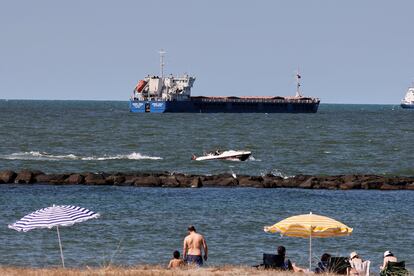Turkey detains Russian ship with 4,500 tons of grain allegedly stolen from Ukraine
Turkish customs are investigating the cargo of ‘Zhibek Zholy,’ which departed from Berdyansk and, according to the Ukrainian Embassy, carries documents from the Russian occupation authorities


Turkish customs seized last weekend the Russian-flagged ship Zhibek Zholy, which is anchored in waters near the port of Karasu, on Turkey’s Black Sea coast. Turkish agents are investigating the origin of its cargo at the request of the Ukrainian Prosecutor General’s Office, which demanded its seizure on the grounds that the ship is allegedly carrying grain stolen from Ukraine and because it came from Berdyansk, a Russian-occupied port in south Ukraine.
The Ukrainian ambassador in Turkey, Vasily Bodnar, confirmed to EL PAÍS on Monday that the investigation into the ship is underway, although the Turkish authorities have not yet reported on the result of the probe. A Turkish government source told Reuters that “the allegations are being investigated thoroughly” and that the country’s authorities are in contact with Russia, the United Nations and third parties.
Last week, Yevgeni Balitski, an official of the Russian occupation in the Ukrainian region of Zaporizhia, said that, after the pause of activity due to the war, “the first cargo ship” had left the Ukrainian port of Berdyansk with grain destined for “friendly countries,” according to statements reported by the Russian agency TASS.
The Ukrainian Prosecutor General’s Office identified the vessel as the Zhibek Zholy, and asked Turkish authorities to stop the cargo ship. Ukrainian sources estimate that the Zhibek Zholy had loaded the first cargo of some 4,500 tons of Ukrainian grain from Berdyansk. According to the Turkish television network Haber Global, this grain was set to be shipped to the Turkish port of Karasu and later transported by trucks to Konya and other provinces of Central Anatolia, which is home to many flour mills. The Turkish media said that the Zhibek Zholy did not receive the relevant permit to enter the port of Karasu, so it anchored one kilometer (0.62 miles) from the coast, where it still remains.
This is not the first ship to transport grains and other agricultural products allegedly stolen from Ukraine to Turkish ports. The Ukrainian Embassy in Turkey estimates that around a quarter of the more than 400,000 tons of grain stolen by Russia in Ukraine have ended up in Turkish territory. But this is the first time that Turkish authorities have followed Ukraine’s request to seize a ship.
“The case of the Zhibek Zholy is very particular, because it is the first time that it has come with documents from an occupied territory to a Turkish port, which has created the unique opportunity to stop it and ask Turkey to seize the ship and confiscate its cargo,” said Bodnar. Unlike the Zhibek Zholy, the previous ships carrying allegedly stolen grain arrived in Turkey with documents showing that the cargo was of Russian origin and have been authorized to unload it.
The Ukrainian ambassador considers the case to be a “manifestly illegal” attempt by Russia to use the occupied ports of Ukraine and set a precedent. “That Ukrainian port is officially closed and, according to Ukrainian law, it is illegal to use it. Our information further indicates that the company was forced to load this stolen grain. So they illegally took this grain, illegally loaded it and illegally transported it,” Bodnar said. Turkey recognizes the territorial integrity of Ukraine (including the Crimean peninsula, which has been occupied by Russia since 2014) and its regulations prevent Turkish ports from accepting cargo from occupied territories.
The Zhibek Zholy is owned by a Kazakh company called KTZ, although it is leased by Russia’s Green Line. The Kazakh company told Reuters that it is holding talks with all parties to clarify the situation and would abide by all sanctions and restrictions.
Tu suscripción se está usando en otro dispositivo
¿Quieres añadir otro usuario a tu suscripción?
Si continúas leyendo en este dispositivo, no se podrá leer en el otro.
FlechaTu suscripción se está usando en otro dispositivo y solo puedes acceder a EL PAÍS desde un dispositivo a la vez.
Si quieres compartir tu cuenta, cambia tu suscripción a la modalidad Premium, así podrás añadir otro usuario. Cada uno accederá con su propia cuenta de email, lo que os permitirá personalizar vuestra experiencia en EL PAÍS.
¿Tienes una suscripción de empresa? Accede aquí para contratar más cuentas.
En el caso de no saber quién está usando tu cuenta, te recomendamos cambiar tu contraseña aquí.
Si decides continuar compartiendo tu cuenta, este mensaje se mostrará en tu dispositivo y en el de la otra persona que está usando tu cuenta de forma indefinida, afectando a tu experiencia de lectura. Puedes consultar aquí los términos y condiciones de la suscripción digital.








































